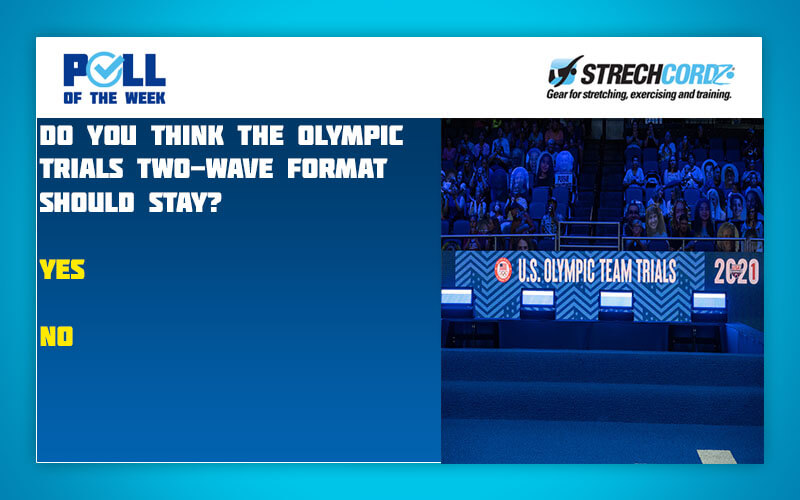Swim Poll of the Week: Should the Two-Wave Olympic Trial Format Stay?

This is the Swim Poll of the Week for Wednesday June 23, 2021, sponsored by Strechcordz Swim Training Products. In our last poll, we wanted to know: Should the two-wave Olympic Trials format stay?
Wave I of the United States Olympic Trials concluded earlier this month in Omaha, Nebraska with a shortened event schedule compared to the typical, eight-day setup. It was a different feel from a normal Olympic Trials – with no national teamers and a handful of fans. But the overall product was still exciting, and swimming was on TV four nights in a row. The question has to be asked: Is a two-wave Olympic Trials the way of the future or does it die along with COVID?
With the COVID-19 pandemic causing so much uncertainty for the sporting world in 2021, many fans were concerned with how USA Swimming could conduct a safe Olympic Trials this year.
How would all the qualified athletes be able to fit in the two 50 meter pools for warmups? How would seating work in the stands? It was not feasible to make Trials a regional competition by splitting the meet in two – with some contenders for the Olympic team in one place and others in a different venue. It wouldn’t have been a fair way to select the team.
USA Swimming eventually decided on dividing the meet into two “waves,” with a faster set of cuts created to meet the 41st-seeded time, in order to select the team with a lesser amount of swimmers. Those remaining athletes with Trials cuts would still get to compete in Omaha, albeit not in the same capacity with the members of the Olympic team roaming the deck alongside them.
USA Swimming also provided a little incentive to the Wave I meet, with the top two finishers in each A-Final earning the opportunity to race in Wave II, thus giving the athletes in each final the feel of what fighting for a spot on the Olympic team is like. What looked like a glorified U.S. Open on paper quickly felt like a real Olympic Trials with something at stake in each A-Final.
Many of the swimmers who competed in Wave I got the invaluable experience of gaining a second swim at Trials, while also racing on TV and earning the opportunity to be interviewed. It was something they wouldn’t have gotten at a regular Olympic Trials. Many of the athletes who finished first or second celebrated as if they made the Olympic team, and it gave them the euphoric feeling of making the Olympic Trials cut for the first time all over again.
With many of the athletes and coaches praising the Wave I format, did USA Swimming successfully stumble into a new format for Olympic Trials to fight overcrowding?
Should the two-wave Olympic Trials format stay?
Yes – 51%
No – 49%

Show how special you are and become a member of the International Swimming Hall of Fame’s “One In A Thousand” Club. Help keep the International Swimming Hall of Fame moving forward toward a new vision and museum by joining now!


- 2016 USA TRIALS ARCHIVE
- ARCHIVES OF OLYMPIC TRIALS VIA SWIMMING WORLD VAULT
- 2021 USA OLYMPIC TRIALS WAVE I CUTS
- 2021 USA OLYMPIC TRIALS WAVE II CUTS
- HEAD USA OLYMPIC COACHES
- 2016 FULL RESULTS
- WAVE I FULL RESULTS
- PSYCH SHEET
- DAY ONE RESULTS
- DAY TWO RESULTS
- DAY THREE RESULTS
- DAY FOUR RESULTS
- DAY FIVE RESULTS
- DAY SIX RESULTS
- DAY SEVEN RESULTS
- DAY EIGHT RESULTS




No! All the swimmers I know want to go to the “Real”Olympic Trials with all the top athletes. Wave 1 will become a glorified time trial to qualify for the actual Olympic Trials. Even this year, the perception among fans, friends and many swimmers was that Wave 1 wasn’t the real Olympic Trials. Many swimmers train their whole life to get to the Trials (and farther). For the majority who make it, it is the biggest competition they ever go to. Dividing it into Waves will take that Olympic Trials experience with the best swimmers in the US away from them.
If the meet must be divided – split it into a Mens & Womens Olympic Trials.
Yes, so many great Wave 1 stories and swims and provides more exposure to the kids and sport
No, for families that have multiple swimmers if one qualifies for wave 1 and another for wave 2 it is an increased financial burden. Plus, spectators had to buy tickets to both waves in case their swimmer got a wave 2 cut before the meet; just made it hard to plan for hotels, leave/vacation.